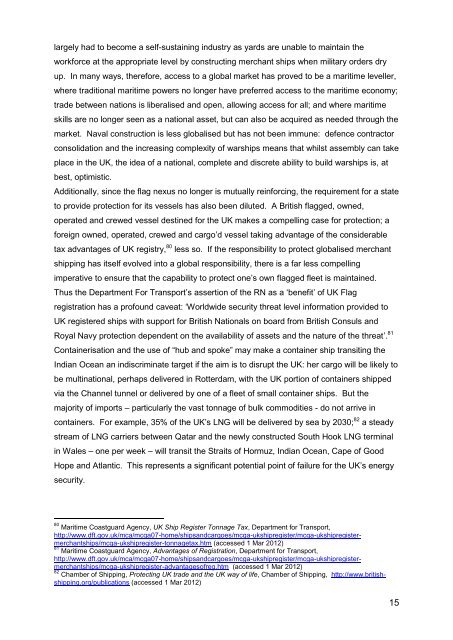90 percent by sea - Defence Academy of the United Kingdom
90 percent by sea - Defence Academy of the United Kingdom
90 percent by sea - Defence Academy of the United Kingdom
Create successful ePaper yourself
Turn your PDF publications into a flip-book with our unique Google optimized e-Paper software.
largely had to become a self-sustaining industry as yards are unable to maintain <strong>the</strong><br />
workforce at <strong>the</strong> appropriate level <strong>by</strong> constructing merchant ships when military orders dry<br />
up. In many ways, <strong>the</strong>refore, access to a global market has proved to be a maritime leveller,<br />
where traditional maritime powers no longer have preferred access to <strong>the</strong> maritime economy;<br />
trade between nations is liberalised and open, allowing access for all; and where maritime<br />
skills are no longer seen as a national asset, but can also be acquired as needed through <strong>the</strong><br />
market. Naval construction is less globalised but has not been immune: defence contractor<br />
consolidation and <strong>the</strong> increasing complexity <strong>of</strong> warships means that whilst assembly can take<br />
place in <strong>the</strong> UK, <strong>the</strong> idea <strong>of</strong> a national, complete and discrete ability to build warships is, at<br />
best, optimistic.<br />
Additionally, since <strong>the</strong> flag nexus no longer is mutually reinforcing, <strong>the</strong> requirement for a state<br />
to provide protection for its vessels has also been diluted. A British flagged, owned,<br />
operated and crewed vessel destined for <strong>the</strong> UK makes a compelling case for protection; a<br />
foreign owned, operated, crewed and cargo’d vessel taking advantage <strong>of</strong> <strong>the</strong> considerable<br />
tax advantages <strong>of</strong> UK registry, 80 less so. If <strong>the</strong> responsibility to protect globalised merchant<br />
shipping has itself evolved into a global responsibility, <strong>the</strong>re is a far less compelling<br />
imperative to ensure that <strong>the</strong> capability to protect one’s own flagged fleet is maintained.<br />
Thus <strong>the</strong> Department For Transport’s assertion <strong>of</strong> <strong>the</strong> RN as a ‘benefit’ <strong>of</strong> UK Flag<br />
registration has a pr<strong>of</strong>ound caveat: ‘Worldwide security threat level information provided to<br />
UK registered ships with support for British Nationals on board from British Consuls and<br />
Royal Navy protection dependent on <strong>the</strong> availability <strong>of</strong> assets and <strong>the</strong> nature <strong>of</strong> <strong>the</strong> threat’. 81<br />
Containerisation and <strong>the</strong> use <strong>of</strong> “hub and spoke” may make a container ship transiting <strong>the</strong><br />
Indian Ocean an indiscriminate target if <strong>the</strong> aim is to disrupt <strong>the</strong> UK: her cargo will be likely to<br />
be multinational, perhaps delivered in Rotterdam, with <strong>the</strong> UK portion <strong>of</strong> containers shipped<br />
via <strong>the</strong> Channel tunnel or delivered <strong>by</strong> one <strong>of</strong> a fleet <strong>of</strong> small container ships. But <strong>the</strong><br />
majority <strong>of</strong> imports – particularly <strong>the</strong> vast tonnage <strong>of</strong> bulk commodities - do not arrive in<br />
containers. For example, 35% <strong>of</strong> <strong>the</strong> UK’s LNG will be delivered <strong>by</strong> <strong>sea</strong> <strong>by</strong> 2030; 82 a steady<br />
stream <strong>of</strong> LNG carriers between Qatar and <strong>the</strong> newly constructed South Hook LNG terminal<br />
in Wales – one per week – will transit <strong>the</strong> Straits <strong>of</strong> Hormuz, Indian Ocean, Cape <strong>of</strong> Good<br />
Hope and Atlantic. This represents a significant potential point <strong>of</strong> failure for <strong>the</strong> UK’s energy<br />
security.<br />
80 Maritime Coastguard Agency, UK Ship Register Tonnage Tax, Department for Transport,<br />
http://www.dft.gov.uk/mca/mcga07-home/shipsandcargoes/mcga-ukshipregister/mcga-ukshipregistermerchantships/mcga-ukshipregister-tonnagetax.htm<br />
(accessed 1 Mar 2012)<br />
81 Maritime Coastguard Agency, Advantages <strong>of</strong> Registration, Department for Transport,<br />
http://www.dft.gov.uk/mca/mcga07-home/shipsandcargoes/mcga-ukshipregister/mcga-ukshipregistermerchantships/mcga-ukshipregister-advantages<strong>of</strong>reg.htm<br />
(accessed 1 Mar 2012)<br />
82 Chamber <strong>of</strong> Shipping, Protecting UK trade and <strong>the</strong> UK way <strong>of</strong> life, Chamber <strong>of</strong> Shipping, http://www.britishshipping.org/publications<br />
(accessed 1 Mar 2012)<br />
15

















